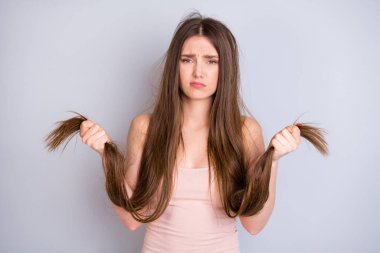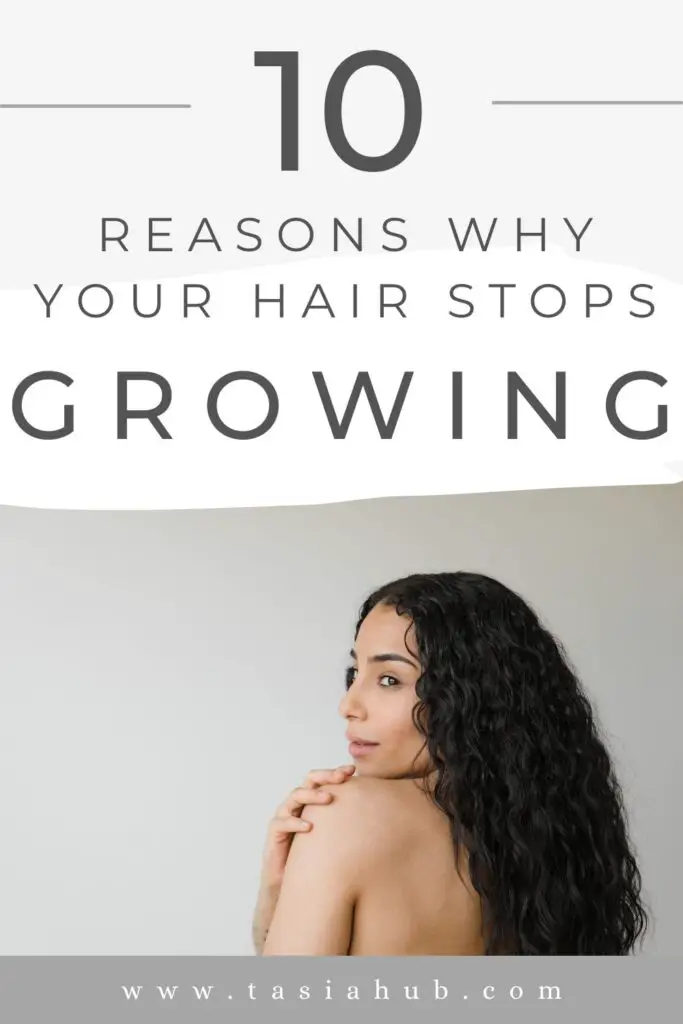Why Hair Stops Growing: Understanding The Causes And Solutions

Are you wondering why your hair has stopped growing? Are you experiencing thinning hair and loss of volume?
While these changes can occur naturally with age, they can also be a sign of an underlying medical condition that requires attention. It’s important to understand the different causes of hair loss to ensure timely treatment and regain healthy tresses.
In this comprehensive guide, we will explore the various factors that can lead to hair growth interruption and provide solutions to promote regrowth.
How Does Hair Grow?
Before we delve into the reasons why hair stops growing, let’s first understand the hair growth cycle.
Each hair follicle goes through a growth cycle consisting of four phases: anagen (growth phase), catagen (transition phase), telogen (resting phase), and exogen (shedding phase). The length and volume of your hair are determined by this cycle.
On average, hair grows at a rate of 6 inches per year, with the anagen phase lasting between 2-6 years. However, it’s essential to note that individuals may have different hair growth cycles influenced by various factors such as genetics, hormones, and overall health.

Studies have shown that even seasonal changes can impact hair growth, with faster growth observed during winter months compared to slower growth in summer.
Now that we have a basic understanding of how hair grows, let’s explore the most common reasons why hair stops growing.
Why Hair Stops Growing
1. Genetics
Your genes play a significant role in determining the length, color, volume, and strength of your hair. If you have naturally long and healthy locks without much effort, you can thank your genes.
However, if you are experiencing thinning hair or hair loss, it’s important to take extra care and implement strategies to prevent further damage and promote hair growth.
2. Stress Level
Stress, both physical and psychological, can have a detrimental impact on hair growth, research has shown that stress can trigger a condition called Telogen Effluvium, which causes hair to enter the resting phase prematurely, resulting in a significant reduction in hair growth.
While this condition usually resolves on its own within six months, it can still disrupt the hair growth cycle and lead to noticeable hair loss. Managing stress through activities like exercise, yoga, and therapy can help alleviate its impact on hair growth.
3. Age
As we age, our hair undergoes changes that can affect its growth, the anagen phase of the hair growth cycle tends to shorten with age, leading to follicle dormancy.
Additionally, factors such as overall health, diet, and hair care practices accumulated over a lifetime can impact the hair growth cycle. It’s important to adopt a healthy lifestyle and proper hair care routine to support optimal hair growth as we age.
4. Hair Breakage
Hair breakage can give the illusion that your hair is not growing, an average person’s hair grows at a rate of about 6 inches per year.
However, if you notice that your hair is not increasing in length over time, it may be due to excessive breakage.
Over-processing, heat styling, and inadequate hair care practices can lead to dry and brittle hair, making it prone to breakage. By adopting proper hair care techniques and avoiding excessive styling and heat, you can prevent breakage and promote healthier hair growth.
5. Split Ends
Split ends are a common problem, particularly for those with dry hair, when the ends of your hair become dry and brittle, they start splitting, leading to breakage.
While split ends cannot be repaired, you can prevent them from causing further hair breakage by regularly trimming them. It’s important to take good care of your hair, ensuring it receives enough moisture and nutrients to prevent split ends and promote healthy growth.
6. Hairstyles And Styling Products
The hairstyles we choose and the products we use can have a significant impact on hair growth. Chemical treatments, excessive combing, tight hairstyles, and the use of serums can damage the hair and scalp, impeding hair growth.
It’s important to choose hairstyles and products that are suitable for your hair type and avoid excessive manipulation and the use of harsh chemicals. Maintaining a healthy scalp free from conditions like dandruff and infections is also crucial for promoting hair growth.
7. Dry Hair And Scalp
Dry scalp and hair are signs of unhealthy hair, lack of moisture or an imbalance in moisture levels can result in dry hair, leading to breakage and restricted growth.
It’s important to moisturize your hair regularly using natural products and methods to promote healthy hair growth, keeping your scalp hydrated and free from infections is also crucial for maintaining optimal hair health.
8. Alopecia Areata
Alopecia areata is an autoimmune disorder that causes hair loss in patches, it occurs when the immune system mistakenly attacks the hair follicles, leading to hair loss and growth interruption.
While the exact cause of alopecia areata is unknown, it is believed to have a genetic component, people with certain conditions like hay fever, vitiligo, Down syndrome, pernicious anemia, asthma, and thyroid issues have a higher risk of developing alopecia areata.
Treatment options, including medication and phototherapy, are available to manage this condition and promote hair regrowth.
9. Lack Of Exercise And Healthy Diet
A healthy diet and regular exercise play a crucial role in promoting hair growth. Your hair, like your body, requires essential vitamins, minerals, and nutrients to thrive.
Deficiencies in iron, protein, zinc, vitamin A, or biotin can weaken your hair, making it more susceptible to damage and loss.
It’s important to maintain a balanced diet and consider taking supplements to ensure your hair follicles receive the necessary nourishment for optimal growth.
Additionally, regular exercise improves blood circulation, which can benefit hair growth.
10. Thyroid Problems
Irregularities in thyroid hormone production can have a negative impact on hair growth, both hypothyroidism (underactive thyroid) and hyperthyroidism (overactive thyroid) can cause hair thinning and hair loss.
These conditions affect the body’s metabolism and functionality, which can disrupt the hair growth cycle. Proper diagnosis and treatment of thyroid issues are necessary to restore hormonal balance and promote hair regrowth.
Solutions For Promoting Hair Growth
Now that we have explored the common causes of hair growth interruption, let’s discuss some solutions to promote hair regrowth:
1. Maintain A Healthy Lifestyle
Adopting a healthy lifestyle is crucial for optimal hair growth, this includes following a balanced diet rich in vitamins, minerals, and nutrients that support hair health.
Regular exercise improves blood circulation, which promotes hair growth. Additionally, managing stress through relaxation techniques and getting enough sleep are essential for maintaining overall hair health.
2. Proper Hair Care Routine
Implementing a proper hair care routine is essential for promoting hair growth. This includes using suitable hair products for your hair type, avoiding excessive heat styling and chemical treatments, and minimizing hair breakage through gentle handling and proper detangling techniques.
Regularly trimming split ends and avoiding tight hairstyles can also prevent damage and promote healthier hair growth.
3. Nourish Your Hair And Scalp
Nourishing your hair and scalp is crucial for promoting hair growth, this can be achieved through the use of natural hair masks, oils, and serums that provide essential nutrients and moisture to the hair follicles.
Massaging the scalp stimulates blood circulation, promoting hair growth. Additionally, maintaining a clean and healthy scalp free from conditions like dandruff is important for optimal hair health.
4. Seek Medical Advice
If you are experiencing severe hair loss or if your hair is not growing despite implementing lifestyle changes and proper hair care practices, it’s important to seek medical advice.
A healthcare professional or dermatologist can diagnose any underlying medical conditions that may be causing hair growth interruption and recommend appropriate treatments or medications to address the issue.
5. Consider Hair Growth Supplements
In some cases, hair growth supplements may be recommended to support hair regrowth. These supplements typically contain vitamins, minerals, and herbs that promote hair health and growth.
However, it’s important to consult with a healthcare professional before starting any supplements to ensure they are safe and suitable for your individual needs.
Conclusion
Understanding the reasons why hair stops growing is the first step toward promoting healthy hair growth. Genetics, stress, age, poor hair care practices, and underlying medical conditions can all contribute to hair growth interruption.
By adopting a healthy lifestyle, implementing a proper hair care routine, nourishing your hair and scalp, and seeking medical advice when necessary, you can support hair regrowth and maintain healthy tresses.
Remember, each individual’s hair growth journey is unique, so be patient and consistent in your efforts to achieve the desired results.

